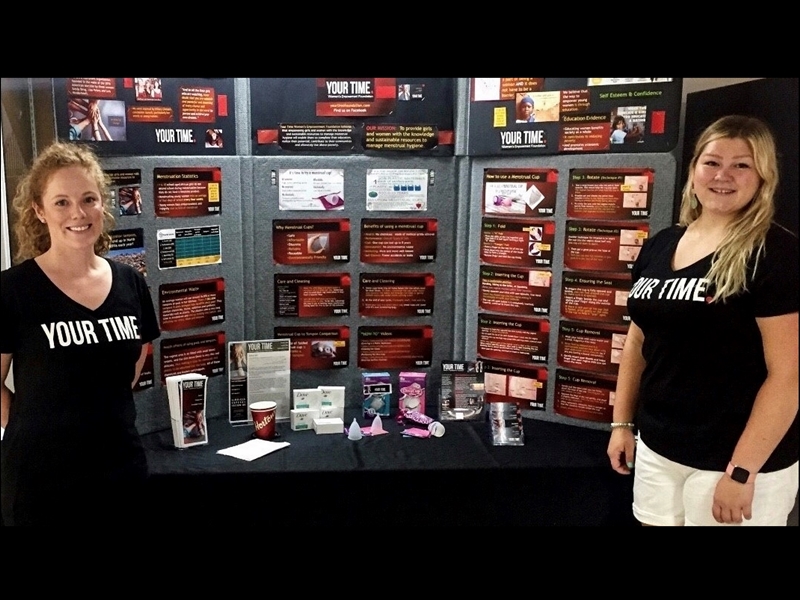
Partnership works to end ‘period poverty’
It isn’t just an issue affecting women in faraway countries, it’s happening right here in Saskatchewan.
For women living in poverty, lack of access to basic menstrual hygiene products or adequate sanitation can result in time missed at work, school, and other activities, leading to disadvantages that are often difficult to overcome.
Known as ‘period poverty,’ lack of menstrual protection due to financial barriers isn’t just an issue affecting women in faraway countries.
“It is appalling that that’s happening right here in Canada,” said Sandy Beug, co-founder of Your Time Women’s Empowerment Foundation (Your Time). The organization is at the forefront of tackling period poverty in partnership with the University of Saskatchewan’s College of Nursing and School of Public Health.
Initiative educates, distributes cups, to create change
In 2017, Your Time launched an initiative to outfit disadvantaged women in Regina and in nearby First Nations communities with free, reusable silicone menstrual cups. The goals were to identify girls and women in need, educate them on how to use and sanitize the cups, and answer any questions about reproductive health. Your Time also has programs in Malawi, where they distributed 100 cups, as well as in Colombia and India.
Women can wear the cups for up to 12 hours before they need to empty them, and they last from five to 10 years. The cups are less expensive and more environmentally sustainable than disposable menstrual supplies. It costs roughly the same for three to four months’ supply of tampons and pads.
This summer, two College of Nursing students, Jazlynn Badduke and Sarah Leippi, were funded by the School of Public Health to work with Your Time in inner-city Regina and First Nations communities. They met with young women, speaking with them to reduce the stigma around having their periods, and to educate them about menstrual hygiene.
"Hearing the struggles, challenges, and barriers of the women was heartbreaking. Women had to do degrading and unsanitary things in order to carry out their daily activities. Seeing the look on their face when they were presented with a cup was a rewarding experience I will never forget," said Leippi.
The next phase of the project will be to send students to First Nations communities, to interview Tribal Councils and Elders and determine how to move forward, respecting cultural values.
Together with the Canadian company that makes the cups, the partnership distributes the cups to young homeless women in Regina who have trouble affording food, let alone menstrual supplies. The partnership works through Street Culture Project, a community agency that helps vulnerable people in the city.
“The ongoing expense of sanitary protection is a challenge for women living in poverty anywhere in the world. The fact that this was a community-generated project to support other communities presented us with an exciting opportunity to make a very small investment to achieve positive, real-world, public health outcomes,” said USask School of Public Health Executive Director Dr. Steven Jones (PhD).
“Ideally, in our province, menstrual hygiene management would be covered as part of our hospitalization card, and be available to every woman,” said Beug.
Beug, along with other women’s health advocates around the world, sees limited access to adequate menstrual hygiene as a health issue, and a gender equality issue.
Menstrual cups can be life changing
Plan International Canada polled 2,000 Canadian women under the age of 25 to see what the social, emotional and financial costs of menstruation were. One-third said they’ve struggled to afford menstrual products, which, along with items like toilet paper, soap and water, are essential to women’s health. This impedes their full participation at school and work.
It doesn’t have to be that way.
“We’ve seen in Malawi, that menstrual caps have made a profound difference in a woman's life,” said Beug. “They used to use grass and old rags because they couldn’t buy disposable pads or tampons. They were getting infections, chafing on thighs, and they were embarrassed by the smell and frequent leakage.”
Now, with their new menstrual cups, they go to school and work while they are having their period, Beug said.
“That’s what the foundation is here for,” said Beug.
The partnership between Your Time, College of Nursing, and School of Public Health is a unique opportunity to address a complex global issue related to gender equity and sustainable development, with great potential to go further.

